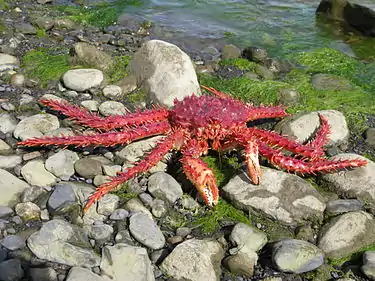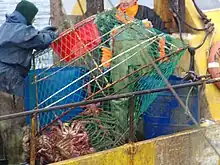Lithodes santolla
Lithodes santolla, also known as the southern king crab, Chilean king crab or centolla, is a species of king crab, found off southern South America including the offshore Falkland Islands.[3] On the Pacific side, it is found in Chile from Talcahuano to Cape Horn.[3][4] On the Atlantic side, it is found off Argentina and Uruguay.[3] It lives in the benthic zone at depths of 0–700 m (0–2,300 ft),[3] with Uruguayan records being exclusively from great depths.[5] In Chile, it mostly lives at depths to 150 m (490 ft), but south of 40° S it can be found to 600 m (2,000 ft).[4] It is a large crab that can reach up to 19 cm (7.5 in) in carapace length, and it is the target of commercial fishing.[3]
| Lithodes santolla | |
|---|---|
 | |
| Recently dead individual at Puerto Natales, Chile | |
| Scientific classification | |
| Domain: | Eukaryota |
| Kingdom: | Animalia |
| Phylum: | Arthropoda |
| Class: | Malacostraca |
| Order: | Decapoda |
| Suborder: | Pleocyemata |
| Infraorder: | Anomura |
| Family: | Lithodidae |
| Genus: | Lithodes |
| Species: | L. santolla |
| Binomial name | |
| Lithodes santolla (Molina, 1782) | |
| Synonyms [1][2] | |
| |
Physiology
L. santolla lives in cold-temperature and subantarctic waters. Ideal temperatures for its larval and juvenile development range from 6 to 15 °C (43 to 59 °F), and its larval stages are nonfeeding.[5] It experiences respiratory acidosis and hyperglycemia after prolonged exposure to air;[6] however, these levels eventually return to normal after reimmersion, making it capable of withstanding long periods of aerial exposure with no detrimental effect on mortality.[7]
Fishing

The population of Lithodes santolla has seen a dramatic decline due to commercial fishing.[5]
The lucrative centolla fishery around Tierra del Fuego led to an incident in August 1967 when the Argentine schooner Cruz del Sur was found fishing 400 metres (1,300 ft) from Gable Island and had to be escorted out of Chilean waters by the Chilean patrol boat Marinero Fuentealba.[8] This event among many others led to the Beagle crisis in the late 1970s.
The United States Food and Drug Administration lists the centolla crab and southern king crab as two separate species: Lithodes antarcticus and Lithodes santolla respectively.[9] Other sources consider Lithodes antarcticus to be a synonym of Lithodes santolla.
References
- Vinuesa, J. H.; G. A. Lovrich & F. Tapella (1999). "New localities for Crustacea Decapoda in the Magellan region, southern South America" (PDF). Scientia Marina. 63 (suppl. 1): 321–323. doi:10.3989/scimar.1999.63s1321.
- WoRMS (2019). "Lithodes santolla (Molina, 1782)". WoRMS. World Register of Marine Species. Retrieved May 29, 2019.
- Palomares ML, Pauly D, eds. (2023). "Lithodes santolla" in SeaLifeBase. July 2023 version.
- "Pesquera Melinka en Punta Arenas ofrece Centolla, Centollón y Caracoles". Servicios Agrícolas y Agroindustria. Retrieved January 17, 2009.
- Anger, Klaus; Lovrich, Gustavo A.; Thatje, Sven; Calcagno, Javier A. (August 2004). "Larval and early juvenile development of Lithodes santolla (Molina, 1782) (Decapoda: Anomura: Lithodidae) reared at different temperatures in the laboratory". Journal of Experimental Marine Biology and Ecology. 306 (2): 217–230. doi:10.1016/j.jembe.2004.01.010 – via ResearchGate.
- Schvezov, Natasha; Lovrich, Gustavo A.; Romero, M. Carolina (March 2017). "Oxidatide stress during re-immersion of the king crab Lithodes santolla (Molina, 1782) (Decapoda Anomura: Lithodidae) after air exposure". Journal of Crustacean Biology. 37 (2): 195–203. doi:10.1093/jcbiol/rux004. JSTOR 26792811.
- Urbina, Mauricio A.; Paschke, Kurt; Gebauer, Paulina; Cumillaf, Juan Pablo; Rosas, Carlos (December 2013). "Physiological responses of the southern king crab, Lithodes santolla (Decapoda: Lithodidae), to aerial exposure". Comparative Biochemistry and Physiology Part A: Molecular & Integrative Physiology. 166 (4): 538–545. doi:10.1016/j.cbpa.2013.08.006. PMID 23973259.
- Patricia Arancibia Clavel & Francisco Bulnes Serrano (2004). La Escuadra En Acción: 1978: el conflicto Chile-Argentina visto a través de sus protagonistas (in Spanish). Santiago: Maval Ltda. ISBN 956-258-211-6.
- "Seafood List". U.S. Food and Drug Administration. Archived from the original on 21 September 2013.
External links
 Media related to Lithodes santolla at Wikimedia Commons
Media related to Lithodes santolla at Wikimedia Commons The dictionary definition of centolla at Wiktionary
The dictionary definition of centolla at Wiktionary